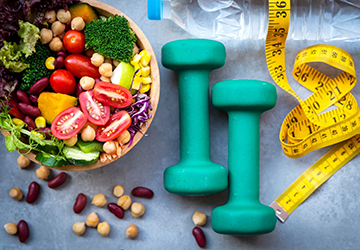Do you ever feel like you run out of time in the day? Juggling work, family, and other duties can make it seem impossible to stick to healthy routines.
But skimping on proper nutrition, exercise, and self-care can sap our energy, concentration, and wellness.

The good news is that with some planning and prioritizing, we can better fit healthy practices into our packed lifestyles.
This post will discuss five realistic best methods for maintaining good health even on the most hectic schedules. Putting in place small, manageable changes around diet, fitness, sleep, mental health, and more can yield big payoffs over time.
Let's explore these practical techniques and learn how they can boost your health alongside your busy timetable!
5 Best Practices for Maintaining Good Health
Maintaining good health is crucial for having the energy and focus to power through busy days. Here are five proven strategies:
1. Prep Nutritious Grab-and-Go Meals and Snacks
Planning is vital for healthy eating with a packed schedule. Take time on less busy days to batch-prep balanced meals and snacks to have on hand for the week ahead.
Stock your fridge and pantry with nutrient-dense foods like mixed nuts and seeds, fresh and dried fruits, chopped veggies, hard-boiled eggs, Greek yoghurt, cottage cheese, hummus, protein bars/shakes, oatmeal cups, and more.
Package foods in grab-and-go containers to always have healthy options within arm's reach.
2. Schedule Exercise Appointments in Your Calendar
Treat exercise like any other must-do appointment and block offset times in your calendar; this could be 30 30-minute three days a week or an hour class every Saturday morning, whatever realistically fits into your routine. Workouts can be short to be effective. The key is consistency.
Scheduling exercise ensures you follow through rather than fall subject to hectic days crowding it out. Find types of movement you enjoy - this makes sticking with it more accessible.
Experiment with at-home workout videos, streaming fitness classes, meeting a friend for a walk, etc.
3. Incorporate Regular Stretching and Movement Breaks
Sitting for prolonged periods can negatively impact mental and physical health. Counteract this by setting reminders to take movement breaks every 30-60 minutes throughout your day.
Use this time to stand, stretch, walk, or do bodyweight exercises like squats; this boosts energy and reduces muscle tension/tightness caused by sitting.

Ergonomic experts also recommend changing postures throughout the day. Alternate between sitting, standing, and walking for portions of your tasks.
Look into adjustable desks, stability balls, and desk cycles to incorporate more activity into sedentary routines.
4. Prioritize High-Quality Sleep
Functioning at your best with a packed schedule requires quality sleep, as lack of it compounds mental and physical stress.
Make sleep a priority by keeping a consistent bedtime and wake-up schedule, allowing for 7-9 hours nightly. Limit blue light exposure in the evenings by dimming devices and screens.
Develop a calming pre-bedtime routine as it cues your body to unwind. Try light stretching, herbal tea, reading, meditation, etc.
Invest in supportive mattresses, pillows and linens to optimize comfort.
5. Take Regular Mental Health Breaks
Finally, take into account the value of brief breaks for mental well-being. Counteract stress Build in 5-15 minutes of relaxing activities periodically through hectic days.
Enjoy a short walk outdoors, listen to uplifting music or a podcast, meditate, dive into a hobby, connect with supportive friends or family, or do breathing exercises.
Identify go-to mini breaks that help you destress so you can take them as needed. Protect this time to rest and recharge so you can better tackle responsibilities.
Conclusion
After reviewing these realistic, manageable tips, we hope you feel equipped with new knowledge and motivation to prioritize health in your busy life.
The key is to start small by picking just one or two new habits to turn into routines first. Over time, it compounds and creates positive momentum for adding further positive changes.
Stay calm, trying to do everything at once. Find what works for you right now and go from there.
Stay motivated by focusing on how each tiny effort moves you toward your goals.
Frequently Asked Questions
Q. What are some quick healthy snacks I can prepare?
Ans. Some great on-the-go snack options are fresh fruits/veggies, nuts, hard-boiled eggs, Greek yoghurt, protein bars, peanut butter sandwiches, etc. Prepare snacks in batches.
Q. How can I work out if I have limited time?
Ans. Prioritize whatever length of workout you can fit into your schedule, like a quick 20-minute HIIT session. Also, take advantage of small bouts of exercise throughout your day.
Q. What are some examples of mental health breaks?
Ans. Brief mental health activities include meditation/deep breathing, enjoying a hobby, phone/social media breaks, walking outdoors, listening to a podcast, etc. Identify go-to mini breaks that help you destress.




